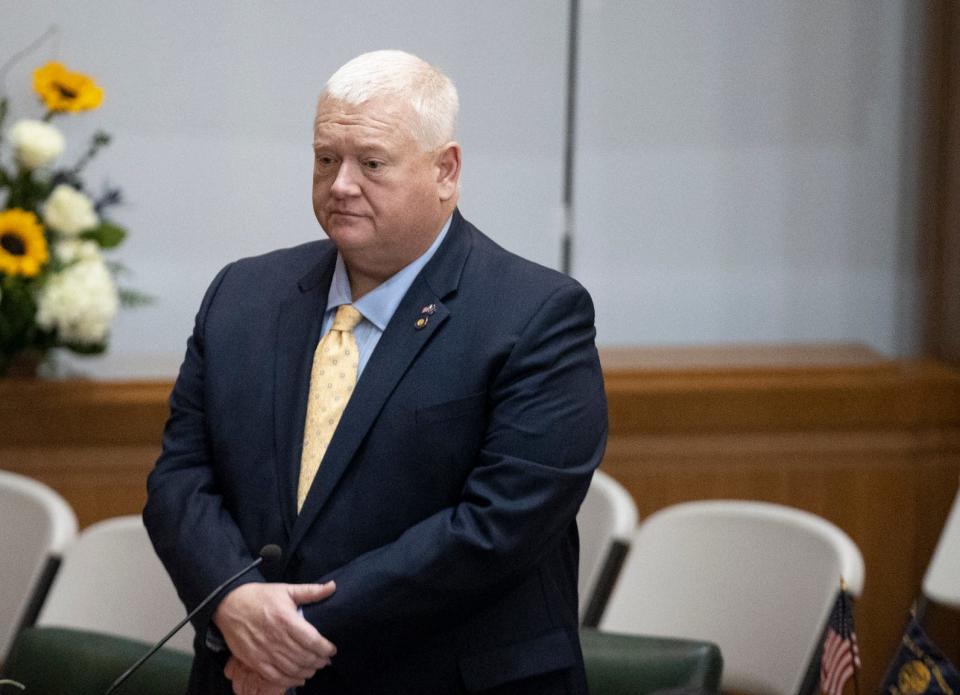Oregon's new domestic terrorism law comes under fire

- Oops!Something went wrong.Please try again later.
Legislation passed by the Oregon Legislature and signed into law by Gov. Tina Kotek to create a new crime of domestic terrorism is intended to target growing "violent extremism," according to supporters.
But social justice groups warn it could be twisted by law enforcement to target activists and communities of color, citing a similar law in Georgia that they say has been used to do exactly that.
Their concerns have been enough to prompt Kotek to include a letter with the signed law stating her administration will be monitoring the implementation of the law, and its impact.
What the law says
House Bill 2772 defines domestic terrorism in the first degree as a crime when a person intentionally destroys or substantially damages critical infrastructure or intentionally releases a toxic substance into "widespread contact."
Critical infrastructure would include utility systems, electric substations, gas or fuel pipelines, wireless communication infrastructure, or a dam, road, airport, marina or rail line. To be classified as "widespread," at least 50 human beings would have had to be impacted.
Attempting to destroy or damage critical infrastructure, attempting to introduce toxic substances into widespread contact, or intentionally possessing a destructive device to impact infrastructure is classified under the new law as domestic terrorism in the second degree.
Bipartisan support, community concern
The bill received bipartisan support during the legislative session and was meant to address an Oregon Secretary of State and Oregon Audits Division report released in March of last year ranking Oregon sixth in the nation for the number of domestic violent extremist incidents from 2011 to 2020.
"Incidents of domestic violent extremism rose precipitously nationally and in Oregon from 2019 to 2021," the report stated.
The report warned that Oregon was one of 16 states without legislation defining or criminalizing these specific acts of domestic terrorism and urged police and lawmakers to do more to address the trend.

On the House floor, chief sponsor Rep. Paul Evans, D-Monmouth, said the bill addressed an "exploitable vulnerability" in state law.
Evans said the bill had been narrowed so that it could not apply to acts of peaceful protest but instead only intentional violence. He said definitions of critical infrastructure and other language in the bill created safeguards from misuse.
"The intent to destroy the infrastructure is an essential element of the crime. Simply interrupting, impairing or inhibiting the critical infrastructure would not qualify," Evans emphasized on the floor.
But in a letter to lawmakers, the American Civil Liberties Union and 23 other social justice and civil liberties organizations warned the bill could have a disparate impact on protestors and activists, as well as Indigenous and Oregonians of color who are over-policed.
The language of the law, the letter stated, was still overbroad and open to abuse.
On Monday, the ACLU reiterated its concerns.
The law is unnecessary, ACLU of Oregon policy director Jessica Maravilla said.
"The law targets conduct that was already criminal and adds a stigmatizing label and vague language that could enable law enforcement to mischaracterize protest actions as terrorist activity," she said. "We expect Oregon to be a national model in protections for speech and protest and this law is an alarming step in the wrong direction."
Concerns Oregon will follow Georgia
During the legislative session, Rep. Dacia Grayber, D-Portland, pointed to concerns about the bill being used to harm protestors and marginalized communities.
In May, she asked Aaron Knott with the Multnomah County District Attorney's Office to compare the bill to the statute and broadening of language introduced in Georgia in 2017.

This year, the Georgia law was used to charge more than 40 activists in Atlanta. Some of the protestors charged had camped at the future site of a sprawling $90 million police and fire training center to protest the project.
Knott in his comparison said the Georgia bill lacked the "widespread" impact language included in Oregon's new law. Oregon's statute also focuses on the action itself and the harm that results rather than political beliefs or affiliations, Knott said.
"It is my sincere belief that this bill cannot be used against someone who does not intend violence and intend violence in a very proximate way," he said.
Kotek signs the law, but with strings
Kotek signed the bill into law, but added a letter to her signature.
The law addresses shortfalls in the state's criminal laws, Kotek said. But she added that she had received feedback from Oregonians about the potential for unintended consequences.
She wrote that she appreciated the attempts to address concerns by narrowing the class of people who can be prosecuted to those who intend to cause "widespread harm" to individuals or "widespread" damage to critical infrastructure and other safeguards.
And, she wrote, she'll be monitoring what happens.
"I have directed the Criminal Justice Commission to monitor the use of the new crimes created in House Bill 2772 — from arrest through conviction — and to report back to my office," she wrote.
The ACLU and other organizations have said they will similarly be monitoring for misuse of the law.
This article originally appeared on Salem Statesman Journal: Oregon's new domestic terrorism law comes under fire

